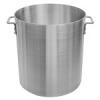Green scrubby pads have always haunted me. They get caught on every little imperfection, screw, or corner of the equipment. Each day during pre-op, we inevitably find a green fiber caught on something.
I am curious if anyone has tried using those stainless steel chain mail scrubbing cloths?
I have purchased a couple for the plant to try, but would like feedback regarding any potential downfalls I have not previously considered.
Thanks!













